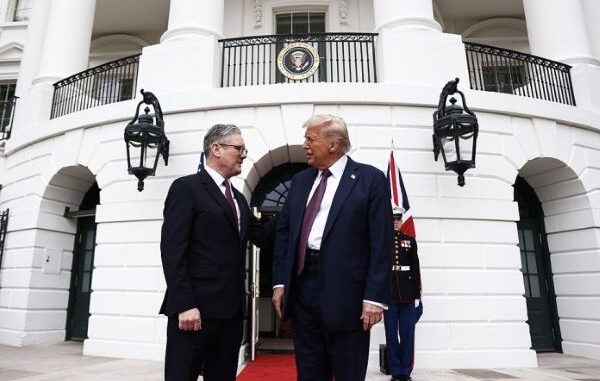
A supposedly ‘historic’ trade deal between the US and UK was signed on 8 May, the first the US had agreed with any country following the chaos unleashed by Trump’s sweeping tariffs in April. Many of the specifics of the deal are still very vague, but it will result in planned tariffs of 25% on UK aluminium and steel being removed and a tariff of 27.5% on UK cars reduced to 10% for the first 100,000 sold to the US each year. In return, the US will be granted greater freedom to export beef to UK markets as well as the UK removing its tariff on US ethanol.
But the reality of the deal is far less impressive than the government suggests. The basic 10% tariff on all other British goods sold to the US is still in place and there has been no suggestion that this will be removed. Even with the promised reduction in tariffs on cars and metals, the average tariff rate on UK products will still be 11%, only a 2% reduction on what the rate was before this deal. Contrast this with the tariff rate of 1% that was in place before Trump unleashed his protectionist policies!
However, the British capitalists in the automotive and metal sectors will no doubt feel some relief. They will use any excuse to justify going on the offensive against the wages and working conditions of their workers. Starmer has claimed the deal will protect thousands of jobs in those industries. But in the capitalist bosses’ hands, no jobs are safe.
Clearly the deal does not signal a return to the era of ‘free trade’ that British capitalism has been used to and dependent on. In reality, Trump has used the threat of worse tariffs to exact economic concessions from Starmer; this will likely be repeated in US trade deals with other countries. As one commentator in the Financial Times put it: “The pact is closer to a protection payment to a mob boss than a liberalising agreement between sovereign countries”.
All of this will only contribute to a continuing pessimism about British capitalism and its complete inability to create economic growth, regardless of whatever deals it may make globally. An economist quoted in the Financial Times said of the trade deal: “We do not expect this to lead to a noticeable impact on UK GDP”. The same is true for the recently announced trade deal with India which is estimated to only increase UK GDP by 0.1% – by 2040! All of this will lead to more pressure on Starmer and Reeves to further cut public spending and continue their austerity offensive against the working class.
Neither protectionism nor free trade will serve the interests of the working class, they are both based on a capitalist system that profits from our exploitation. The way to protect jobs and services in Britain and internationally is not through trade wars or free trade agreements, but through trade union struggle for decent wages and working conditions, through the nationalisation under democratic workers’ control of companies, and through fighting for a socialist planned economy where the vast wealth that exists can be employed in the interests of the majority.
